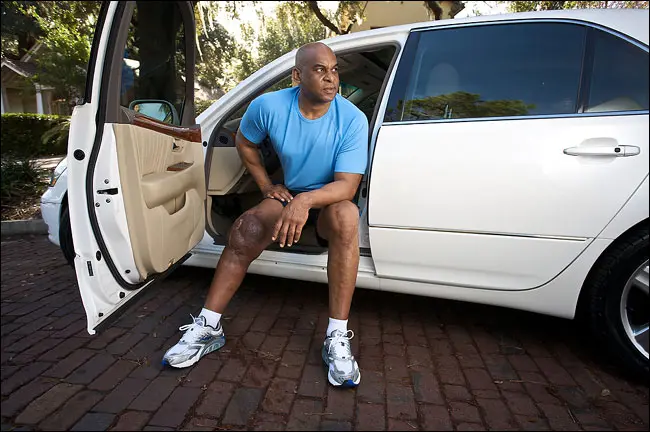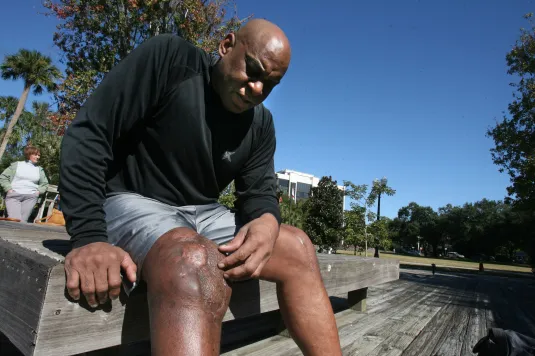Do no harm: Who should bear the costs of retired NFL players’ medical bills?
good article from the washington post. long read though
===============================================================
After 24 knee operations, the National Football League's former Man of the Year leans heavily on a crutch. When Reggie Williams pulls up his pants leg, what's underneath looks like the trimmings from a butcher shop. His right leg is so ravaged that it's three inches shorter than his left. Worse, it's uninsured.
Once, Williams was the NFL’s high ideal. From 1976 to 1989 he was a spring-legged linebacker for the Cincinnati Bengals who set franchise records and played in two Super Bowls. Off the field, he was a civic-minded Dartmouth graduate who won humanitarian awards and served as a city councilman while he was still playing. He was so loyal to the game that he was a pallbearer at legendary team founder Paul Brown’s funeral. He would even be invited to apply for the job of NFL commissioner.
But now, Williams and his battered legs amount to a bill no one wants to pay. Since 2005 Williams, 58, has suffered a cascade of health problems he says stem from his 14-year football career, including multiple knee replacements and a bone infection, which he estimates have cost him hundreds of thousands of dollars out of pocket.
Williams says he is unable to qualify for most NFL disability benefits, and the Bengals — the only team for whom he played — are opposing him in a workers’ compensation claim that would provide for his medical care. These tedious battles have transformed him from a league champion into a critic. “All they’ve done is fought me on everything,” he says, “including even sending me a Band-Aid.”
Who should bear the costs of football-related medical problems that arise years after retirement? This question is at the heart of Williams’s case — and scores of others like it. The average NFL player’s career lasts just 3.9 seasons, according to the NFL Players Association’s latest figures. Studies show that one in four retirees will need a joint replacement, they suffer arthritis at five times the rate of their peers and are four times as likely to suffer neurodegenerative diseases, such as Alzheimer’s or ALS.
Critics say the NFL’s medical benefits don’t adequately address the full range of these problems. The NFL’s health insurance lasts five years after retirement — players who lasted fewer than three seasons don’t qualify for it at all — but the most serious health consequences of a football career often don’t manifest for a decade or more.
The NFL’s disability board, jointly administered by management and the players’ union, has a denial rate of almost 60 percent. When players file for workers’ compensation for the on-the-job harm they suffered, they often find their claims opposed by their former teams.
The league is currently in legal and legislative fights with at least 3,000 former players, who, like Williams, have attempted to seek reparation for their injuries by filing claims in worker-friendly states. When these claims and all other avenues for medical care are exhausted, the cost of their poor health can often fall on the taxpayer.
“First and foremost, the NFL is in the hurt business,” said Mel Owens, a former NFL player who is now a California attorney and represents Williams. “In workers’ comp they will end up paying for the players’ brains, hearts and livers, as well as orthopedic injuries, and it’s expensive. But they don’t want to pay at all.”
The NFL contends it offers benefits — many extending beyond an athlete’s employment — that are more generous than those offered in most professions. Workers’ compensation is just one of those, afforded to players by the collective bargaining agreement with NFL owners. When it opposes claims, the NFL says it is seeking to limit what would otherwise be “nearly unlimited exposure” for years-old injuries..............
Do no harm: Who should bear the costs of retired NFL players


good article from the washington post. long read though
===============================================================
After 24 knee operations, the National Football League's former Man of the Year leans heavily on a crutch. When Reggie Williams pulls up his pants leg, what's underneath looks like the trimmings from a butcher shop. His right leg is so ravaged that it's three inches shorter than his left. Worse, it's uninsured.
Once, Williams was the NFL’s high ideal. From 1976 to 1989 he was a spring-legged linebacker for the Cincinnati Bengals who set franchise records and played in two Super Bowls. Off the field, he was a civic-minded Dartmouth graduate who won humanitarian awards and served as a city councilman while he was still playing. He was so loyal to the game that he was a pallbearer at legendary team founder Paul Brown’s funeral. He would even be invited to apply for the job of NFL commissioner.
But now, Williams and his battered legs amount to a bill no one wants to pay. Since 2005 Williams, 58, has suffered a cascade of health problems he says stem from his 14-year football career, including multiple knee replacements and a bone infection, which he estimates have cost him hundreds of thousands of dollars out of pocket.
Williams says he is unable to qualify for most NFL disability benefits, and the Bengals — the only team for whom he played — are opposing him in a workers’ compensation claim that would provide for his medical care. These tedious battles have transformed him from a league champion into a critic. “All they’ve done is fought me on everything,” he says, “including even sending me a Band-Aid.”
Who should bear the costs of football-related medical problems that arise years after retirement? This question is at the heart of Williams’s case — and scores of others like it. The average NFL player’s career lasts just 3.9 seasons, according to the NFL Players Association’s latest figures. Studies show that one in four retirees will need a joint replacement, they suffer arthritis at five times the rate of their peers and are four times as likely to suffer neurodegenerative diseases, such as Alzheimer’s or ALS.
Critics say the NFL’s medical benefits don’t adequately address the full range of these problems. The NFL’s health insurance lasts five years after retirement — players who lasted fewer than three seasons don’t qualify for it at all — but the most serious health consequences of a football career often don’t manifest for a decade or more.
The NFL’s disability board, jointly administered by management and the players’ union, has a denial rate of almost 60 percent. When players file for workers’ compensation for the on-the-job harm they suffered, they often find their claims opposed by their former teams.
The league is currently in legal and legislative fights with at least 3,000 former players, who, like Williams, have attempted to seek reparation for their injuries by filing claims in worker-friendly states. When these claims and all other avenues for medical care are exhausted, the cost of their poor health can often fall on the taxpayer.
“First and foremost, the NFL is in the hurt business,” said Mel Owens, a former NFL player who is now a California attorney and represents Williams. “In workers’ comp they will end up paying for the players’ brains, hearts and livers, as well as orthopedic injuries, and it’s expensive. But they don’t want to pay at all.”
The NFL contends it offers benefits — many extending beyond an athlete’s employment — that are more generous than those offered in most professions. Workers’ compensation is just one of those, afforded to players by the collective bargaining agreement with NFL owners. When it opposes claims, the NFL says it is seeking to limit what would otherwise be “nearly unlimited exposure” for years-old injuries..............
Do no harm: Who should bear the costs of retired NFL players

